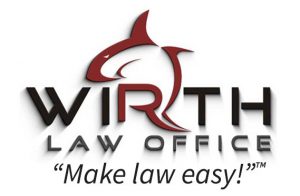Consult an Attorney When Assistance Needed
Video Transcribed: You’ve just been to court on a protective order or another case where the judge, as part of your bond, said no contact. But the other person is having contact with you, what happens? My name is Ryan Cannonie, I am the Tahlequah family attorney for the Wirth Law Office in Cherokee County. And this is a question and I go over this with clients till I’m blue in the face.
The person on the other side, especially on domestics, when there’s a protective order and when they’re as part of a bond for a domestic case, like a misdemeanor or felony charge, we usually have no contact with the victim in this. I go over with my clients all the time, they will probably contact you, do not contact them. When they contact you, here’s what to say and I’ll usually tell my clients a little script. Why do I do this?
 Well, most of my clients will come in and other people as well, potential clients and then just people I know and say, “Well, he or she got a protective order against me.
Well, most of my clients will come in and other people as well, potential clients and then just people I know and say, “Well, he or she got a protective order against me.
And they’re talking to me, can I turn them in for that?” No, that’s not how protective orders work, it’s not how no contact orders work. So a protective order and a no-contact order is on you, it’s on the person whoever it’s on. It’s not on the person who is being, quote, protected from it.
So you can’t go into the Sheriff’s Office and be like, “Hey, they violated their own protective order by contacting me,” if you have contact back with them.
Now, most of the time prosecutors will use some common sense hopefully, on this, same with courts. What if they’re contacting you and you tell them to stop it or something like that, then that still contacts with them. But a lot of times they’ll take that into account.
That doesn’t mean they will every time. So don’t have contact. That’s what those mean. Let’s start with the protective order. If you violate the protective order, if they contact you, everything seems fine.
You contact them back, they get mad again at you or if something happens in this or they take something you say incorrectly, then that’s a violation of protective order. That’s another criminal offense against you.
That means another bond, another warrant and it means it’s going to be harder for your attorney to get you a good deal on your first charge. So that’s what happens in a protective order. Also, during the protective order, the judge is more likely to order it and is probably going to be pretty mad at you.
In your criminal case, let’s say you have a no-contact order. This happens not only in domestic cases or protective order cases, it also happens in a lot of victim cases. Any burglaries or anything like that, you’ll get a no-contact in most victim cases.
If you break that, well, the state prosecutor can come to the judge, file a motion to revoke your bond, there’s a hearing on that. And if the judge sees that you broke it, then they can increase your bond amount and make you pay more money or they can put you back in jail.
Now, there’s a statute on no bonds and it’s left a little bit to interpretation on some of it. It’s specific as to what category of offense you can give a no bond to. The court has to make a determination there. But one of the categories, one of the things that they can take into account in making that decision, is if you violate orders of the court.
So if there’s a no-contact order, you’re told that you have contact, you violated an order of the court. So the court can increase bond or even look at, possibly, a no bond for you. And what that means is you go back to jail, not the other person, nothing happens to them. It’s you. So if you are involved in a protective order case, if you’re involved in a victim case and have a no-contact, well first off, get an attorney.
Talk to your attorney about it. If you talk to me, I’m going to tell you the same thing I tell all my clients, no means no. That’s what no-contact order means. If they’re contacting you, then they can always go and ask for that protective order or no-contact order to be… Either the protective order dismissed or the no contact order lifted. The protective order is something they sought out against you. No contact orders are done by the court to protect them from you.
So they can go ask that those be lifted. Most of the time, courts will listen to a victim in cases and lift the no-contact order. And if they want to dismiss the protective order, they’re the one that filed it, that’s their right to dismiss it. So a lot of times, people start to reconcile in these.
When I was a prosecutor, I saw it. As a defense attorney, I’ve seen it. People get back together but the problem is that they get back together while there’s still a no-contact order between all of them.
And so if there are any other issues, well then all of a sudden, you can find yourself back in jail. If you’re in this situation, if you need advice on the situation, if you need an attorney on this situation, then please give us a call. Go to tahlequahattorney.com. Let us know, I’m sure we can help. Thank you.








